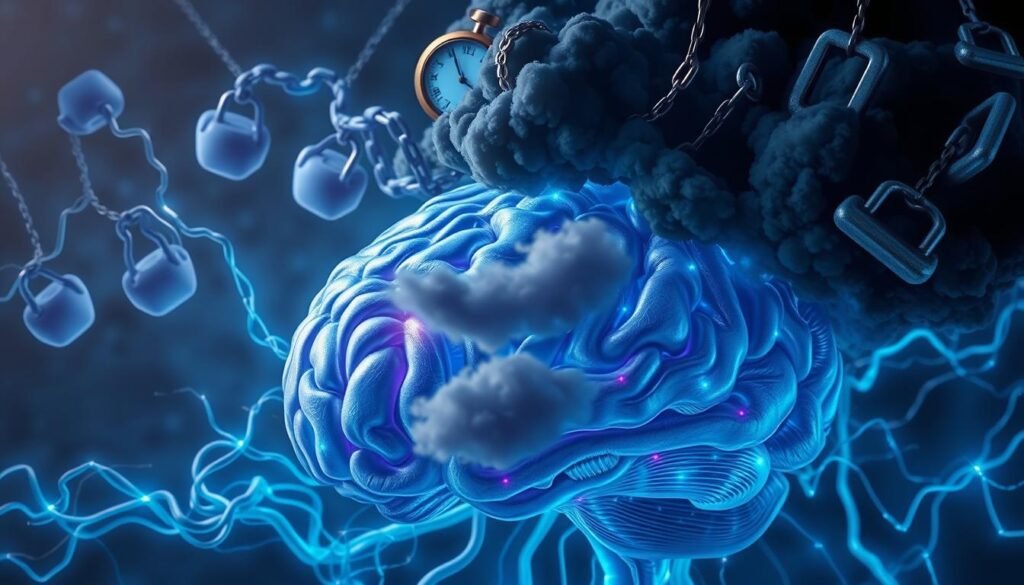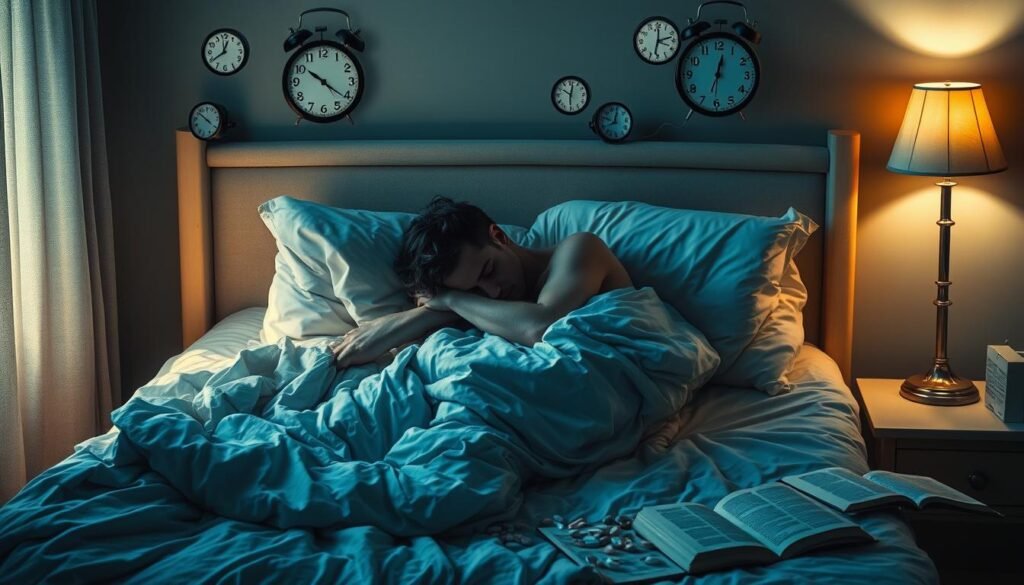Did you know up to one-third of adults can’t sleep well? This fact is very concerning for public health. Research shows a strong link between trouble sleeping and anxiety-related problems. Anxiety can make it hard to fall or stay asleep due to worrying thoughts or being too alert.
Anxiety and insomnia often happen together, making it important to understand their connection. Sleep is crucial for thinking clearly and managing emotions. So, when anxiety interferes, sleep quality drops, and anxiety gets worse. We’re going to look into how anxiety leads to insomnia. This will help us learn more about sleep issues, the different kinds, and related mental health concerns.
Key Takeaways
- Anxiety and insomnia often coexist, creating a debilitating cycle.
- Up to one-third of adults experience insomnia symptoms, impacting daily life.
- Sleep is crucial for cognitive function, emotional regulation, and overall health.
- Chronic insomnia is a significant risk factor for anxiety disorders.
- The relationship between anxiety and sleep disturbances is bidirectional.
Understanding Insomnia
Insomnia is one of the top sleep disorders that affects many adults. It’s often not understood well. Adults need 7 to 9 hours of good sleep every night to be their best. When stress or upsetting events happen, short-term insomnia can kick in. This might last for days or even weeks. This sleep trouble can mess with how you think and feel day to day.
Chronic insomnia lasts for three months or more and brings tougher challenges. As people get older, they tend to have insomnia more. About 28.6% of adults say they’ve been told they have insomnia. It happens more in women than men. While a bad night’s sleep happens to everyone now and then, some have ongoing problems.
The reasons people get insomnia can vary a lot. It’s more common in women, those over 60, and people dealing with health or mental problems. Being stressed or having a wacky sleep schedule doesn’t help either.
Insomnia doesn’t just affect one person—it hits society too. It can mess with your job performance and make driving risky. The impact on mental health is big, making anxiety and depression more likely. Over time, it could even lead to serious health worries like high blood pressure and heart disease.
Knowing what insomnia does and how it ruins sleep is key. It’s super important to figure out why it happens and how to treat it. This is because it really changes how well people can live their lives.
| Type of Insomnia | Duration | Common Causes |
|---|---|---|
| Short-term Insomnia | Days to Weeks | Stress, Distressing Events |
| Chronic Insomnia | 3 Months or Longer | Aging, Health Conditions, Stress |
What is Insomnia?
Insomnia is a common sleep disorder that makes it hard to fall asleep or stay asleep. It can hurt a person’s health a lot. Both short-term (acute) and long-term (chronic) insomnia exist, each with its own problems and effects on health.
Definition and Types of Insomnia
Acute insomnia comes from short-term stress and might go away when the stress does. Chronic insomnia lasts over three months and happens at least three times a week. It is often linked with other health problems. This can lead to anxiety and depression. Around one in three adults around the world show signs of insomnia, showing it’s a big problem.
The Role of Sleep Stages
Knowing about sleep stages is important when looking at insomnia’s effects. Sleep has REM (rapid eye movement) and non-REM stages. Both are important for thinking and emotions. Insomnia messes up these important sleep stages. This often causes problems with memory, mood, and mental sharpness. Long-term lack of sleep from insomnia can raise cortisol levels. That can make anxiety and stress worse.
| Type | Duration | Common Causes |
|---|---|---|
| Acute Insomnia | Short-term | Stressors, travel, life changes |
| Chronic Insomnia | More than 3 months | Medical conditions, mental health issues, medications |
Insomnia doesn’t just mess with sleep quality. It also plays a big part in mental health issues. Treating it right, like with cognitive behavioral therapy, can tackle both insomnia and its causes of anxiety.
The Link Between Anxiety and Sleep Disorders
Anxiety and sleep disorders have a complex relationship. Anxiety often leads to sleep problems like insomnia. Studies show that ongoing anxiety can make it hard for people to fall asleep or stay asleep.
One study with 25,130 participants revealed a strong link between insomnia and developing anxiety disorders. This suggests that often, people with insomnia are likely to face anxiety issues later. Nearly all young people who reported anxiety also struggled with sleep problems.
Anxiety can worsen insomnia, and then insomnia makes the anxiety even more severe. This cycle might cause mental health troubles, including depression and substance abuse. For those with anxiety, insomnia rates are much higher than average.
- In cases of chronic insomnia, links to severe mental health conditions are evident.
- Depression is prevalent in 14–31% of individuals with insomnia.
- Medication options like selective serotonin reuptake inhibitors (SSRIs) can alleviate both anxiety and sleep disturbances.
Understanding how anxiety and insomnia are connected helps in finding effective treatments. Treating anxiety can improve sleep quality. For more on how these disorders are related, check out this research study.
| Condition | Prevalence | Associated Disorders |
|---|---|---|
| General Insomnia | 6-10% | Anxiety Disorders |
| Insomnia with Anxiety | 42-63% | Depression |
| Individuals with Both | 25.9% (High Risk) | Higher ESS and PSQI Scores |
How Anxiety Causes Insomnia
Anxiety is a big reason why people can’t sleep well. It affects both the body and mind, leading to sleep problems. Knowing how these elements work together shows why anxiety and poor sleep are linked.
Physiological Mechanisms
Insomnia often starts with the body’s stress hormones kicking in. These hormones mess up sleep. When we’re very anxious, our body is ready to either flee or fight. This state makes it hard to sleep well. As a result, people with anxiety often feel tired and cranky the next day. This tiredness can make their anxiety even worse, creating a difficult cycle.
Cognitive Behavioral Patterns
How we think plays a big role in sleep issues when we’re anxious. Worries make it hard to fall or stay asleep. Studies show that people with anxiety wake up a lot at night. Treatments like cognitive behavioral therapy (CBT) can help. They work on changing these thought patterns. This can help people with anxiety sleep better.

| Disorder | Insomnia Symptoms | Treatment Effectiveness |
|---|---|---|
| Generalized Anxiety Disorder (GAD) | Greater disturbances in sleep, more frequent insomnia symptoms | CBT effective for insomnia reduction |
| Panic Disorder | Link between poor sleep quality and panic symptoms | CBT shows significant effectiveness |
| Posttraumatic Stress Disorder (PTSD) | Persistent insomnia symptoms, even post-CBT treatment | Clinical insomnia remains prevalent after treatment |
| Social Anxiety Disorder | Increased odds of insomnia symptoms and poorer sleep quality | CBT yields less optimal treatment outcomes |
| Obsessive-Compulsive Disorder (OCD) | Mixed results regarding insomnia association | Comorbid disorders may influence outcomes |
The link between anxiety-induced insomnia and how we think and feel is clear. This shows the need to tackle both mental and physical aspects for better sleep.
The Impact of Stress on Sleep Quality
Stress significantly impacts sleep quality, affecting both your immediate and long-term sleep. By understanding stress’s role, we can see its effect on overall health.
Short-Term vs. Long-Term Stress Effects
Short-term stress can disrupt sleep temporarily. High stress levels make falling asleep harder and break up sleep patterns. This leads to daytime tiredness, hurting focus and mood. Americans usually sleep about 6.7 hours each night. This is less than the 7 to 9 hours recommended. Stress is a big reason why, with 43% saying it kept them awake in the last month.
Long-term stress can turn into chronic insomnia, making restful sleep hard to find. Chronic sleep lack causes metabolism and endocrine issues. Adults sleeping less than 8 hours report more stress, averaging a stress score of 5.5. Those who get enough sleep report less stress, with a score of 4.4.
Sleep quality is also affected by screen time before sleep, drinking caffeine late, and too much light in the bedroom. It’s crucial to improve sleep habits. Poor sleep leads to more fatigue and irritation, especially in Millennials and Gen Xers. A relaxing bedtime routine, like warm baths and yoga, helps improve sleep quality.
If you have serious sleep problems, getting professional help is a good idea. Learning how stress affects sleep shows that better sleep habits improve mental and physical health. For more on sleep deprivation and mental health, click here.
Psychological Stress as a Cause of Insomnia
Psychological stress has a big effect on sleep and can lead to insomnia. Many adults—up to two-thirds—face insomnia at some point. About 10% to 15% say it hurts their daily life. Things like relationship problems or work stress trigger the body’s stress response. This messes up sleep patterns.
Stress comes in different forms: short-term acute stress, repeated short-term stress, and long-term chronic stress. Chronic stress is ongoing and strongly linked to insomnia. It’s even worse for those with anxiety disorders. Long-term stress can cause health issues like high blood pressure and diabetes. These can lead to sleep disorders like sleep apnea.
Stress ups cortisol levels, making you overly alert but then tired. This hurts sleep quality, damaging deep and REM sleep. Stress can lead to short-term acute insomnia, lasting less than three months. If it goes on for longer, it’s chronic insomnia. This happens when stressors don’t go away.
It’s key to address psychological stress to treat insomnia properly. Sadly, about 60% of those suffering don’t get help. This impacts their job and happiness. A plan that looks at both psychological and physical factors is vital. It can help break the cycle of stress-related insomnia.

Anxiety and Mental Health Concerns
The link between anxiety and mental health is very important. It shows a lot about a person’s struggle with insomnia. Knowing about this helps us care for our well-being better. Both anxiety and insomnia play off each other, affecting our mental health.
Bidirectional Relationship Between Anxiety and Insomnia
People with anxiety may find it hard to sleep well. About 36% of people with an anxiety disorder also have insomnia. This lack of sleep can make their anxiety worse. This creates a tough cycle of worry and sleepless nights.
Nearly 20% of American adults deal with anxiety disorders. Social Anxiety Disorder alone affects about 7.1% of people. With such high rates of insomnia among them, it’s clear how linked anxiety and mental health are. For those with PTSD, 90% have trouble sleeping.
Improving sleep can help a lot with anxiety, studies show. The Anxiety and Depression Association of America says better sleep can reduce anxiety. Bad sleep can make anxiety disorders worse. This is key to finding good ways to deal with mental health issues.
Common Anxiety Symptoms Associated with Insomnia
Anxiety and insomnia are closely linked. Anxiety shows up as restlessness, too much worry, and panic. These feelings make insomnia worse. It’s like being stuck in a loop of worry and lack of sleep.
Identifying Anxiety Triggers
Finding out what causes your anxiety is key to tackle insomnia. You might notice certain situations or thoughts make your anxiety spike. This makes it hard to sleep. About 40% of people with anxiety struggle with insomnia too. This shows how crucial it is to know your triggers. Common ones are:
- Stressful life events
- Constant worry about work or personal stuff
- Thinking negatively a lot
- Worries about health
Dealing with these triggers can help you sleep better. Studies suggest cognitive behavioral therapy (CBT) works well. It addresses anxiety and sleep problems. Making your bedtime routine calm and consistent also helps a lot.
Understanding how anxiety and not sleeping well are connected helps find the right treatment. Talking to a doctor can give you more ideas on how to manage these issues. For more on treating insomnia, check out this resource.

Effective Anxiety Treatments and Management Strategies
Managing anxiety can make life better and improve sleep. There are many good ways to treat anxiety. They target the main causes of sleep problems and lessen their effects. Cognitive Behavioral Therapy (CBT) is one main method. It helps people change negative thoughts and actions, especially those that cause insomnia. Mindfulness and different coping ways are also key. They help ease anxiety symptoms and lead to better sleep.
Cognitive Behavioral Therapy (CBT)
Cognitive Behavioral Therapy is a method backed by a lot of research. It aims at the thought patterns linked to anxiety and sleep issues. This therapy helps identify and tackle distorted thinking that raises anxiety levels. By changing these thoughts, people can worry less about sleep. This can improve sleep quality. Studies show that CBT not only reduces anxiety symptoms but also fights insomnia well. This helps create a peaceful sleep environment.
Mindfulness Techniques and Coping Strategies
Mindfulness techniques can really help with anxiety. Things like meditation, deep breathing, and muscle relaxation bring calmness. These strategies tackle anxiety’s physical effects. They help the body relax which makes it easier to sleep. Using these techniques often can stop the cycle of worry and sleeplessness. This boosts mental health and well-being.
| Treatment Method | Description | Effectiveness |
|---|---|---|
| Cognitive Behavioral Therapy (CBT) | Focuses on altering negative thought patterns and behaviors associated with anxiety. | High – Reduces anxiety symptoms and improves sleep quality. |
| Mindfulness Techniques | Involves practices like meditation and breathing exercises to promote relaxation. | Moderate – Helps alleviate stress and anxiety, aiding in better sleep. |
| Medication | Includes both over-the-counter and prescription options to manage anxiety symptoms. | Variable – Can help reduce symptoms but may not be suitable for everyone. |
| Lifestyle Changes | Involves improving daily habits such as regular exercise and a sleep routine. | High – Enhances overall well-being and can reduce anxiety levels. |
Using a mix of these treatments can make a big difference in handling anxiety and sleep issues. By adopting these methods, people can enjoy healthier sleep. This leads to better mental health.
Environmental Factors Influencing Sleep
Several environmental factors can affect how well we sleep at night. A cozy sleep environment is key for restful sleep. Things like the amount of noise, light exposure, and bed comfort greatly influence sleep quality.
Making changes to these areas can greatly improve how well we sleep.
Where you live also matters for your sleep health. For example, areas with green spaces or water features can help adults sleep better. Trees and plants are good for heart health, which is also good for sleep.
Neighborhoods with paths, parks, and places for activities encourage exercise. This can help with sleep issues and might help prevent sleep apnea. Studies show that bad walking environments in a neighborhood are linked to worse sleep quality.
Access to healthy food in your area plays a role too. A high number of fast food spots and less variety in local land use are tied to obesity. This affects sleep negatively. Having better options for staying active and eating well can reduce diabetes risk and manage weight. This helps with sleep too.
Your personal sleep environment and the larger area you live in show why it’s vital to consider these factors for better sleep. For more information on this, check out this detailed study relevant research.
| Environmental Factors | Impact on Sleep Quality |
|---|---|
| Noise Levels | Can disrupt sleep and contribute to sleep latency. |
| Light Exposure | Affects melatonin production, influencing sleep onset. |
| Bed Comfort | Inadequate support can lead to discomfort, hindering rest. |
| Green Spaces | Associated with lower anxiety and better sleep duration. |
| Neighborhood Walkability | Promotes physical activity, reducing risks of sleep apnea. |
Anxiety Causes Insomnia: Coping Strategies for Better Sleep
For people fighting insomnia, especially when anxious, sleeping better can hugely improve life. Relaxation methods are key for better sleep. Mindfulness at bedtime brings calm, easing anxiety.
Having a steady sleep schedule is crucial. This means sleeping and waking up at the same times daily. It helps you fall asleep easier at night. Try to skip daytime naps for more restful nights.
Adding relaxing activities to your evening helps too. Try deep breathing or muscle relaxation for 20 to 25 minutes before bed. This can lower stress. Yoga, tai chi, or meditation can also help you relax and sleep better.
Some find herbal teas like chamomile soothing. Others use essential oils such as lavender or lemon balm to help sleep. Making your bedroom a happy sleep space can lessen stress.
It’s important to get help for anxiety or other mental health issues. Getting these issues treated can really improve your sleep. This makes life better overall.
Conclusion
Understanding how anxiety and insomnia are linked is key to better mental health. These issues can shake our emotional stability and daily life. Facing insomnia might lead to feeling overly tired during the day, becoming easily upset, and having trouble with tasks.
This problem is especially true for women and older adults, showing a need for focused care. We must find ways to help these groups fight anxiety and insomnia.
Your emotional well-being and sleep are closely connected. Stress, shifting work schedules, and certain demographic factors can worsen sleep issues. Improving sleep is crucial for handling anxiety better.
Creating personalized sleep improvement plans can keep insomnia’s complications at bay.
Studies show insomnia can increase the risk of Type 2 diabetes. Hence, treating both insomnia and anxiety together is urgent. This approach promotes healthier sleeping patterns and highlights the importance of good rest for better health.
To learn more about how lack of sleep affects mood, click this link.